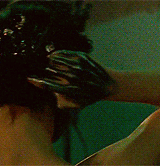Release Year: 2011
Director: Martin Scorsese
Cast: Asa Butterfield, Ben Kingsley, Chloë Grace Moretz, Sacha Baron Cohen.
Plot: The film narrates the adventures of Hugo Cabret alongside Isabelle, with whom he will discover the hidden yet magic truth of the past of George Méliès.
Review: And we finally reach the end of the road. I particularly choose this film to be the closure as a tribute to that journey, since it was 'Hugo' the film that helped me chose this research project many months ago.
I remember watching the movie and gasping all the time due to its beauty. I've said more than once that 3D and digital technologies must be used for plot purposes and in 'Hugo''s case it's something that is strangely achieved; through the breathtaking beauty of the high-definition, master Scorsese gets us into the curious and excentric universe situated in the train station where Hugo lives. That's the first contact; the audience is so visually absorbed by the film that when they start unfolding the mystery behind Isabelle's uncle or the weird machine that Hugo's father left him, all you see is pure magic.
And of course, I also was hooked on that magic. Who else than Martin Scorsese could do such a magnificent tribute to the origins of cinema? There's nothing like watching film industry praising the pioneers of such an incredible world, and when Isabelle quoted Méliès to claim that "Films have the power to capture our dreams" I felt all the hairs on the back of my neck standing up.

And it was the love to cinema that the movie exuded which convinced me to choose this project. The objective was to answer a question and suddenly for me it was crystal clear; which mystery could be better than unfolding the beginning and developments of my biggest passion? For that reason I owe 'Hugo' many things: a remembering of how much I love cinema, a dazzling visual and cinematographic experience and basically every single moment I've been blown away by the magic of films while doing the research project. It's been an amazing journey, and no better way to end it than by returning to how it started.
I remember watching the movie and gasping all the time due to its beauty. I've said more than once that 3D and digital technologies must be used for plot purposes and in 'Hugo''s case it's something that is strangely achieved; through the breathtaking beauty of the high-definition, master Scorsese gets us into the curious and excentric universe situated in the train station where Hugo lives. That's the first contact; the audience is so visually absorbed by the film that when they start unfolding the mystery behind Isabelle's uncle or the weird machine that Hugo's father left him, all you see is pure magic.
Visually breathtaking, the atmosphere created in the train station is warm, golden, and dazzling
And of course, I also was hooked on that magic. Who else than Martin Scorsese could do such a magnificent tribute to the origins of cinema? There's nothing like watching film industry praising the pioneers of such an incredible world, and when Isabelle quoted Méliès to claim that "Films have the power to capture our dreams" I felt all the hairs on the back of my neck standing up.
Martin Scorsese, Thank you for such an inspiring love story about cinema. Both a moviegoer and a master of his field only his incredible talent and his love for films could be able to create "Hugo" as spellbinding as it is
And it was the love to cinema that the movie exuded which convinced me to choose this project. The objective was to answer a question and suddenly for me it was crystal clear; which mystery could be better than unfolding the beginning and developments of my biggest passion? For that reason I owe 'Hugo' many things: a remembering of how much I love cinema, a dazzling visual and cinematographic experience and basically every single moment I've been blown away by the magic of films while doing the research project. It's been an amazing journey, and no better way to end it than by returning to how it started.
.jpg)
.jpg)













